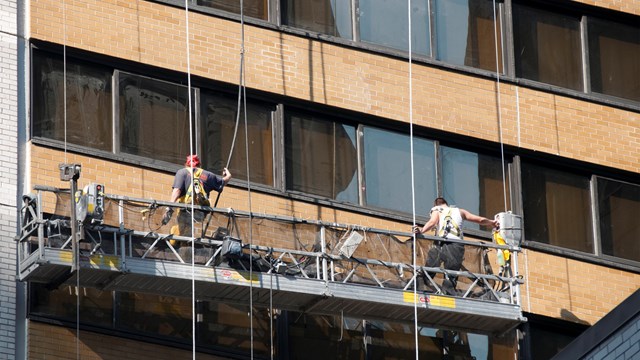So you've noticed your building's façade has lost its luster, or maybe the entryway needs a complete renovation. Before you rush out and hire the first contractor listed in the Yellow Pages, there are many aspects of repair and construction board members self-managing their own buildings should consider. Among the questions you should ponder: Do we need to have an architect or an engineer? How do we find the most qualified contractor for the job? What will construction mean for residents? The steps below may be of help when you're a board on your own and you're faced with renovations, repairs, or new construction.
First things first: Without a managing agent to do the bulk of the legwork vetting out prospective contractors and laborers, it might be to your board's advantage to hire a consultant - often an architect or engineer.
Eugene Ferrara of consulting engineers JMA Consultants in North Bergen, N.J., thinks that the need for retaining a consultant depends on the job. For a major project - such as a complete lobby renovation, or a job that will affect the structure of the building - he thinks boards "should have the guidance of a competent consultant."
Something to consider: Ferrara says that independent boards that work with consultants on major projects usually end up with a completed job that lasts longer. According to Ferrara, projects undertaken without the benefit of a pre-project consultation tend to last between five and seven years, whereas when a consultant is involved in the process, the finished product is much more likely to last longer; often closer to 20 years. Why? A consultant can help you decipher the ins and outs of a complicated project, and he or she may be able to help your board make a decision in the best interest of the building. A consultant can shed some light on aspects of the project you may have overlooked or misunderstood, and in the end, this saves money. To make sure your consultant has the appropriate license(s), check with the State Education Department.
Jason Fox, the president and owner of Astral Construction in Bergenfield, N.J., thinks it's financially beneficial to the board to hire an architect on an hourly basis. It's important, he says, for the architect to maintain his or her objectivity on a project, and that may be difficult to do if the architect is paid a percentage of the total project (which can be anywhere from six to ten percent of a project's cost).
For smaller buildings - particularly those without a managing agent - Pat Garbutt, owner of Manhattan consulting firm Patricia A. Garbutt, PE, suggests hiring an owner's representative. As the title suggests, this person will act as your representative during construction to make sure the contractor is following the document plans and providing the specified materials. She notes that with the aid of an owner's rep, the co-op or condo could realize a cost savings because the representative can negotiate with the contractor in situations the board would be otherwise unaware of.
Let's assume you are using the services of a consultant for your project. Along with the consultant, the board should work together throughout the process of selecting a contractor. Whether you have a managing agent or not, you may want to designate several board members to serve on a committee working more closely on the project, but all board members should be kept in-the-know about the process.
Speak with your consultant to get the names of reputable contractors. Keeping in touch with other co-op or condo boards is also helpful. If you know of a building that's undergone a similar construction project, ask your peers to recommend the contractors with whom they worked. Garbutt also thinks it's helpful to visit the sites of other projects the contractor has completed, to inspect the work yourself.
Before sending out your bids, Garbutt strongly suggests that your board work with a professional consultant to prepare contract documents. "It's worth the money to pay a professional to put together contract documents," she says. The documents will include the scope of work: the quantity of repair, the type of materials needed and the project schedule.
One rule that nearly all consultants live by deserves special mention: never have contractors come to your building to tell you what the problem is. This will only result in confusion and many different opinions. Your consultant will evaluate your particular situation, and you will communicate your repair/construction needs in the documents. "It's like handing a recipe to someone," says Garbutt, as opposed to just making a general statement about needing your lobby renovated. The specifications explain the scope of the work to the bidders, so when they respond to the bid, the board can, says Fox, "compare apples to apples."
Once your documents are in order, send them to the contractors you've selected. As a rule of thumb, Ferrara suggests that a board have at least five bidders for a project costing more than $100,000. The bids should be returned to the board sealed. Once the bids are opened, it's a good idea to have the engineer create a spreadsheet demonstrating the different options from the bidders, suggests Ferrara. The engineer can then discuss these options with the board and managing agent, which will help them make a formal decision of who to include in the rebidding process. Then, gather second bids from the select few contractors you are considering.
After the rebid, you'll want to interview some of the candidates. Make sure the board and consultant are all involved. The interview provides a chance for the board to get a feel for the contractor, to see and meet their potential hire, and to gather references, which you must always check. "The entire board should be well-enough involved," says Ferrara, and individual board members check references, to insure that there isn't only one person involved in this step.
During the interview, you may want to try to negotiate the contractor's price, if you're still not entirely happy with what the contractor has presented. Ask the contractors to submit a final, last bid, on which you will make your decision.
Insurance and Permits
Now that you've selected your contractor, it's time to draw up the contract. Ferrara suggests using a modified American Institute of Architects (AIA) contract. It's best to have your legal counsel prepare the document to ensure that all the elements are clarified and spelled out. Your legal counsel should be knowledgeable about the construction industry. If not, ask your counsel to recommend someone who is. Or, you might want to find a knowledgeable counsel who is an independent third party.
If you didn't do so before, make sure your contractor is licensed to do the type of work you require. For instance, contractors must be licensed to do rigging, and their employees must be certified. In turn, an electrician should have an electrical license, a plumber should have a plumbing license, and so on. If your contractor is going to use a subcontractor, make sure that the sub is properly licensed as well, and check their references, too.
Contractors should carry the proper insurance, which includes worker's compensation insurance and liability insurance. Fox recommends boards carry additional insurance to cover "acts of God." This insurance helps protect against "conditions beyond the control of the contractor," says Fox. Weather-related or natural disasters may be rare, but when they do occur, a board may face thousands of dollars in damages that aren't covered under another policy.
Garbutt suggests asking your contractor if he's bonded. A labor and materials bond will cover the board should the contractor not finish the job. The bonding company will either find a new contractor or pay the co-op or condo the money required to finish the job. She notes that getting a bond is not easy - a contractor must be reputable and qualified to be bonded, so this is another way of checking qualifications.
And what about permits? You'll need a permit for "anything that structurally changes the building," says Fox. Exterior structural changes include the roof. Interior changes that require a permit include electrical work and rewiring.
When you're not changing the structural integrity of the building, no permit is required. A job such as installing a new floor, or replacing a toilet, does not require a permit. When you're unsure about whether you'll need to obtain permits, check with the New York Department of Buildings Web site at (http://www.ci.nyc.ny.us/html/dob/home.html).
It's the contractor's responsibility to inconvenience residents as little as possible, while still completing the work. Fox has certain standards his company follows while on-the-job. The work area must be kept as neat and clean as possible. At the end of the day, the area is "broom cleaned" - that is, anything in the work area that can be swept is cleaned with a broom. If the project is significantly involved and messy, the board might want to hire someone to clean more extensively.
The contractor is also responsible for keeping residents and passersby safe. This generally includes taping off construction areas with caution tape, directing foot-traffic, and, if possible, having people avoid the construction area all together. It's a good idea to post signs and notify all residents of construction projects before they begin. "Communicate with residents what type of construction will take place, how long it will take, and apologize in advance for any resulting noise, dust, etcetera," says Fox.
No matter how well you prepare residents for upcoming construction, there is bound to be at least one person who feels inconvenienced. One way to reduce the number of complaints you might receive is to have construction projects take place with work commencing during weekday daytime hours (Monday through Friday, from 8:00 a.m. to 5:00 p.m., for example). Fox advises, however, that some people are home during the day, and for those people, there's not much that contractors can do. This is why most contractors really appreciate a strong board that will step in and handle owner or shareholder complaints.
Garbutt notes that the type of bill you receive will depend upon the type of job. For larger jobs, the contractor might submit an AIA application for payment monthly (or periodically, depending on the timeframe of the construction). The application will contain a breakdown of the scope of work and the percentage of work completed. For a smaller job, the contractor might just send one bill after the project is complete.
Ferrara advises against paying a down payment. "Only pay on progress," he says, urging boards to withhold around ten percent of the fee until the job is completed. He adds: "Always get a waiver of lien with each payment request from the contractor."
Although Ferrara notes that there are occasions when building may have to make a down payment, you should make sure the contractor you hire is financially stable, in which case he or she will not need a hefty sum to begin a project.
Take the right steps before your contractor goes on-the-job, and you'll end up with longer-lasting results, a clean and complete plan everyone understands, the person best qualified for the job, and minimally-inconvenienced residents. And the finished product will be well worth your forethought and effort.







Leave a Comment